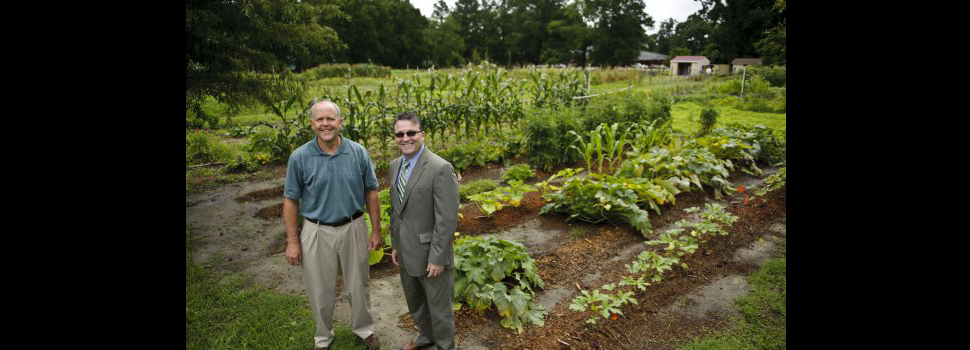By Chick Jacobs, The Fayetteville Observer
Sam Thompson was looking for a sunny spot to plant tomatoes. He ended up leading an award-winning community revolution.
Thompson, an elder at Laurinburg Presbyterian Church, pitched the idea of a community garden to the church six years ago.
What began as a creative use for otherwise empty church property was recently awarded an equipment grant by the North Carolina Council of Churches and Blue Cross and Blue Shield of North Carolina.
“We’re using the grant funds to dig a well,” Thompson said. “Wouldn’t you know this would be the wettest June in years.”
Thompson stood with church pastor Neal Carter in a soggy stand of squash as he spoke. Nearby, Thompson’s stand of Better Boy tomatoes and a stand of 6-foot-tall sunflowers strained to find the sun on a cloud-choked morning.
In all, 40 families have claimed a share of the 1-acre patch about 100 yards from the stately downtown church. Many of the yards nearby boast massive spreading oaks – beautiful, but all but impossible to grow vegetables near.
“Those big old roots just suck up water,” Thompson said. “That was the problem in my yard. There was hardly any sunlight and some very thirsty trees.
“At the same time, we had this plot of land that wasn’t doing anything but getting the grass cut all summer. So six years ago, I proposed we use it as a community garden.”
A small group of church members eagerly accepted the agricultural challenge, and the Laurinburg Presbyterian Church Community Garden was born. Tompson tilled the land, marked plots and planted tomatoes.
Other church members added peas, corn, squash, eggplants, even flowers. To make sure people knew the garden wasn’t limited to church members, fliers were posted around town.
“Soon I was talking to people I might never have met before,” Carter said. “It’s become a wonderful community outreach for the church. People get together and chat, or get to meet neighbors they don’t know. There’s a real sense of community in the garden, a feeling of people working together.”
Thompson noted that the bonds stretch beyond neighbors. “There are people who are bonding with their parents here,” he said. “They bring their dads and dig in the dirt. They come and pick the vegetables. It’s wonderful to see people interacting like that.”
Originally, Carter said, some people worried that vegetables would “walk off” in the night.
“But that hasn’t happened,” he said. “Everyone has been very considerate of everyone’s gardens.”
“The only thief I’ve seen is a squirrel who grabbed a tomato and ran up a tree with it,” Thompson added with a laugh.
Plots are different sizes, depending on the needs and abilities of gardeners. Community gardeners sign annual leases, ranging from $30 to $90 for the largest plots. The leases cover the cost of tilling and preparing the soil each spring.
The only restrictions on gardening are that all crops must be legal; gardeners agree to remove all stakes, tomato cages and ground cover at the end of the growing season; and they agree to donate at least 10 percent of their harvest to charity. Thompson says most people donate far more than that.
Gardener Kurt Heckert said last year he had so many tomatoes growing on his plot that he’d tote bags of produce and give them to seniors. This year, the excessive rainfall has cut into the harvest.
“I may have to pull them up and start again,” he said, shaking his head at the wilted tomato plants in his plot. “The roots can’t breath with all this water. The good thing is we’ve got the whole summer to try again. And this rain can’t last forever.”
Since the garden began, more than 100 families have taken part. Additional plats are donated annually as part of a juvenile court rehabilitation project.
“Without this project, it would just be an empty lot,” Carter said. “Now it’s a place that the church can share with our community.”
With one notable exception.
“We do ask that people refrain from gardening between 11 and 12 on Sunday,” he said, grinning. “There’s a better place to be at that time than in the garden.”
Partners in Health and Wholeness is an initiative of the North Carolina Council of Churches. PHW aims to connect health as a faith issue. Please visit our website to sign your personal pledge to be healthier, and to find out about grant opportunities for places of worship in NC.

